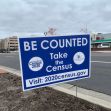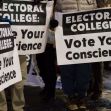Every 10 years, the United States has a census. The census determines how many seats each state gets in the Electoral College and Congress. In Congress, the 435 members of the House of Representatives are determined by the population of each state, and the Senate has 100 members, which is two people per state. That adds up to a total of 535 people in both the Electoral College and Congress.
After the 2020 census, Texas gained two votes in the Electoral College and Congress. Colorado, Florida, Montana, North Carolina and Oregon all gained one vote. California, Illinois, Michigan, New York, Ohio, Pennsylvania and West Virginia all lost one vote.
Some of these numbers were very close. According to Kristin Koslap, senior technical expert on 2020 census congressional apportionment in the Census Bureau's Population Division, "If New York had had 89 more people, they would have received one more seat." This seat went to Minnesota instead.
The new numbers would not have affected the outcome of the 2020 outcome that much. For example, if Biden and Trump ran in 2020 with the new numbers, Biden would have won by 68 electoral votes instead of 74.
In the recent past, the South trended mainly Republican, so Democrats would have to look toward the “Blue Wall” in the North. However, that is shifting. According to Zac McCrary, a Democratic pollster, “It’s almost like two trains passing in the night -- the Sun Belt trending Democratic and the demographics of the Rust Belt going more Republican. But these things don’t happen overnight, so in 2024 we’re going to see a very competitive Rust Belt and a very competitive Sun Belt -- and you could see more splits between the two parties in both regions.”
This would offer Democrats more ways to reach the required 270 votes to win instead of focusing on all the states between Pennsylvania and Minnesota. Democrats can now lose Ohio, which used to be a battleground state but is now starting to lean more Republican, and instead go for states that were once solidly Republican, like North Carolina and Georgia. The Electoral College provides Republicans a system that gives Republicans more power in states that are less urban. This system helped Trump and George W. Bush win the election despite losing the popular vote.
According to Brock McCleary, a longtime Republican pollster, the Republicans’ rebranding as a “working class identity” is required for them to build a “Red Wall” in the Midwest and to be able to hold on to the majority that they have in the Sun Belt long-term.
Biden won with close margins in Wisconsin, Michigan, Pennsylvania, Georgia, and Arizona. Georgia and Arizona went Democrat for the first time in decades. According to U.S. News, “In 2020, Biden got 81 million votes nationally, more than any candidate in history, and led Trump by about 7 million votes. While it was enough to flip five states, including the key Midwestern battlegrounds Trump had stripped from Democrats in 2016, Biden had little margin for error: His combined margin in Georgia, Arizona and Wisconsin was less than 43,000 votes.”
If Trump had won those three states again, he would have been in his second term and Biden would have joined Hillary Clinton (2016) and Al Gore (2000) as Democrats who received the most votes but lost the presidential race.
According to McCrary, “The reality is that in a 50-50 presidential election nationally, Republicans have the (Electoral College) advantage. And unfortunately for Democrats, that stays true even a few points beyond 50-50.”
How these trends will affect Congress and the Electoral College remains to be seen in the 2022 Congressional and 2024 Presidential elections.






